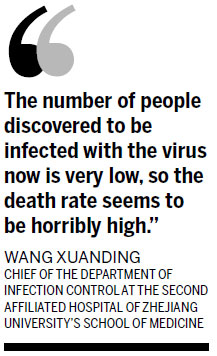Five more H7N9 cases reported, some recover
Updated: 2013-04-12 07:10
By Wang Qingyun in Beijing and Yan Yiqi in Hangzhou (China Daily)
|
||||||||
|
A 64-year-old man confirmed with H7N9 bird flu is transferred between hospitals in Hangzhou, Zhejiang province, on Wednesday. Wei Zhiyang / for China Daily |

Wild birds' migration may carry virus to northern part of country
East China's Jiangsu province and Shanghai municipality reported another five cases of H7N9 on Thursday, while two people infected with bird flu in neighboring Zhejiang province are recovering.
Jiangsu health authorities reported that two men, aged 31 and 65, were infected with the virus and both were in critical condition.
Shanghai Health Bureau reported that three more people aged 68 to 83 were infected, one of whom died from severe pneumonia.
This means 38 people have been confirmed infected nationwide so far.
Meanwhile, a patient in Zhejiang tested negative for bird flu on Thursday.
Zhang Yuntao, deputy director of the intensive care unit at the First Affiliated Hospital of Zhejiang University's School of Medicine, where all H7N9 infected patients in Zhejiang are being treated, said a 51-year-old female patient surnamed Jia had been transferred from the ICU to a normal ward, but this did not mean she has been cured.
"We can only say that the results of her virus tests were negative, but there are still chances that other complications could occur. She is still under close watch," she said.
Zhang said it is unclear when the patient will fully recover.
Specialists in China agree that patients have recovered from H7N9 infection when they demonstrate a normal body temperature, normal physical signs and negative results in two consecutive virus tests.
The hospital's first virus test for a 67-year-old male patient named Yang also turned out to be negative.
Feng Zijian, director of emergency response for the Chinese Center for Disease Control and Prevention, said only a small proportion of people are currently susceptible to the virus, but further evidence is needed to determine who is more prone to the infection.
"Most of the cases reported have shown that the virus can cause serious health conditions and even death, but there are only more than 30 cases of infection compared with all the people who have been in close contact with poultry and birds, such as farmers and butchers," Feng said. "What we have observed has told us it is still a bird flu virus, but we need to watch it continuously for any possible mutation that makes it transmittable among humans."
Wang Xuanding, chief of the department of infection control at the Second Affiliated Hospital of Zhejiang University's School of Medicine, agreed.
According to Wang, H7N9 infection might peak between late April and early May due to the change of seasons, and the number of cases will grow higher, but there is no need to panic.
"The number of people discovered to be infected with the virus now is very low, so the death rate seems to be horribly high. It does not mean that it is incurable," he said.
But Feng from the Chinese Center for Disease Control and Prevention said it is uncertain whether and how the virus will infect people in the north.
Beijing Health Bureau issued a warning on Thursday that birds have started migrating to Beijing, and the migration, which lasts until early May, may bring the virus to local poultry and birds.
Provinces including Hunan, Jiangxi and Liaoning as well as the Inner Mongolia autonomous region have started monitoring the migration, though the State Forestry Administration did not find the virus in 229 samples collected from wild birds in Shanghai, Xinhua News Agency reported on Wednesday.
Contact the writers at wangqingyun@chinadaily.com.cn and yanyiqi@chinadaily.com.cn
(China Daily 04/12/2013 page5)

 In Photos: 7.0-magnitude quake hits Sichuan
In Photos: 7.0-magnitude quake hits Sichuan
 Li Na on Time cover, makes influential 100 list
Li Na on Time cover, makes influential 100 list
 FBI releases photos of 2 Boston bombings suspects
FBI releases photos of 2 Boston bombings suspects
 World's wackiest hairstyles
World's wackiest hairstyles
 Sandstorms strike Northwest China
Sandstorms strike Northwest China
 Never-seen photos of Madonna on display
Never-seen photos of Madonna on display
 H7N9 outbreak linked to waterfowl migration
H7N9 outbreak linked to waterfowl migration
 Dozens feared dead in Texas plant blast
Dozens feared dead in Texas plant blast
Most Viewed
Editor's Picks

|

|

|

|

|

|
Today's Top News
Live report: 7.0-magnitude quake hits Sichuan, heavy casualties feared
Boston suspect cornered on boat
Cross-talk artist helps to spread the word
'Green' awareness levels drop in Beijing
Palace Museum spruces up
First couple on Time's list of most influential
H7N9 flu transmission studied
Trading channels 'need to broaden'
US Weekly

|

|








